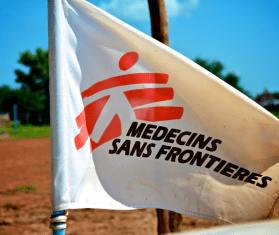The recent executive orders on migration from the Trump administration leave hundreds of thousands of people along the Latin American migration corridor in even greater uncertainty, and exposed to heightened risks on a route already marked by extreme violence, Doctors Without Borders/Médecins Sans Frontières (MSF) warned today.
MSF teams in Mexico are already witnessing the harmful effects of these political measures on the physical and mental health of many of their patients.
On January 20, the Trump administration removed the scheduling functionality for the CBP One app, which allowed migrants to schedule appointments to seek asylum at eight southwest border points of entry. “This irresponsible decision will have both immediate and long-term repercussions for countless individuals, threatening their lives, health, and well-being,” said Adriana Palomares, general coordinator for MSF in Mexico.
CBP One was the sole pathway for asylum requests
Initially launched in 2020 to streamline cargo inspections at the US-Mexico border, the CBP One app expanded in January 2023 to facilitate asylum appointments for unauthorized migrants fleeing violence, poverty, or persecution. By May 2023, it became the primary pathway for asylum requests at US ports of entry under the Biden administration. Over the past year, nearly 1 million migrants—approximately 1,450 people daily—used the app to secure screening appointments.
The app provided a critical, albeit limited, avenue for asylum seekers to avoid hazardous routes and the perils of human trafficking networks. Its abrupt shutdown leaves many of the most vulnerable, including survivors of violence and persecution, with no legal or safe alternatives.
MSF staff report that the closure of CBP One has triggered a wave of despair and uncertainty. Many migrants had already begun to sell belongings, quit jobs, and separate from loved ones in preparation for their journey to the border in anticipation of their upcoming appointments.
“A patient we treated this week suffered an acute anxiety attack after her previously approved asylum appointment in early February was canceled,” said Ramón Márquez, coordinator for MSF’s Comprehensive Care Center (CAI) in Mexico City. “Our therapeutic teams are ramping up interventions to support those in emotional crisis.”

CBP One’s closure increases people’s vulnerability in high-risk areas
The closure of the CBP One app has left migrants stranded in high-risk areas in Mexico, where they are vulnerable to extortion, human trafficking, and other forms of violence. In Coatzacoalcos, a Venezuelan migrant named Silvia, who had been traveling for months, described a collective anguish after receiving care at an MSF clinic:
“The suspension of CBP One leaves migrants more exposed to extortion, mafias, and kidnappings on an already dangerous route," said Mario, another person who is also now stranded in Mexico.
The dehumanizing nature of recent migration policies has exacerbated the crisis. Since November, MSF teams have observed a significant increase in migrant caravans in southern Mexico, with many seeking protection from violence. However, most caravans are dissolved by Mexican authorities before even reaching Mexico City.
On January 21, MSF ran a mobile clinic in Huixtla to provide medical care to a caravan of about 1,500 people—the fourteenth in three months. This phenomenon is merely the visible tip of an iceberg, masking the desperation of hundreds of thousands more.
“These policies dehumanize and endanger people on the move,” said Palomares. “We’ve seen the devastating effects of programs like Remain in Mexico, now being reintroduced, which forced asylum seekers to survive in hostile environments without access to basic services. Migration and seeking asylum are rights not crimes. Governments across the region, including the US and Mexico, must urgently implement migration policies that prioritize people and their protection.”

Our work at the US-Mexico border
In 2024 alone, MSF teams assisted over 700 survivors of sexual violence in Mexico and hundreds more in Central America. With the dismantling of CBP One, migrants are now left in an unbearable limbo, trapped in environments rife with violence and exploitation, and stripped of their basic human rights.
MSF calls on governments in the region to urgently adopt humane migration policies that protect the rights, safety, and dignity of all individuals on the move.




